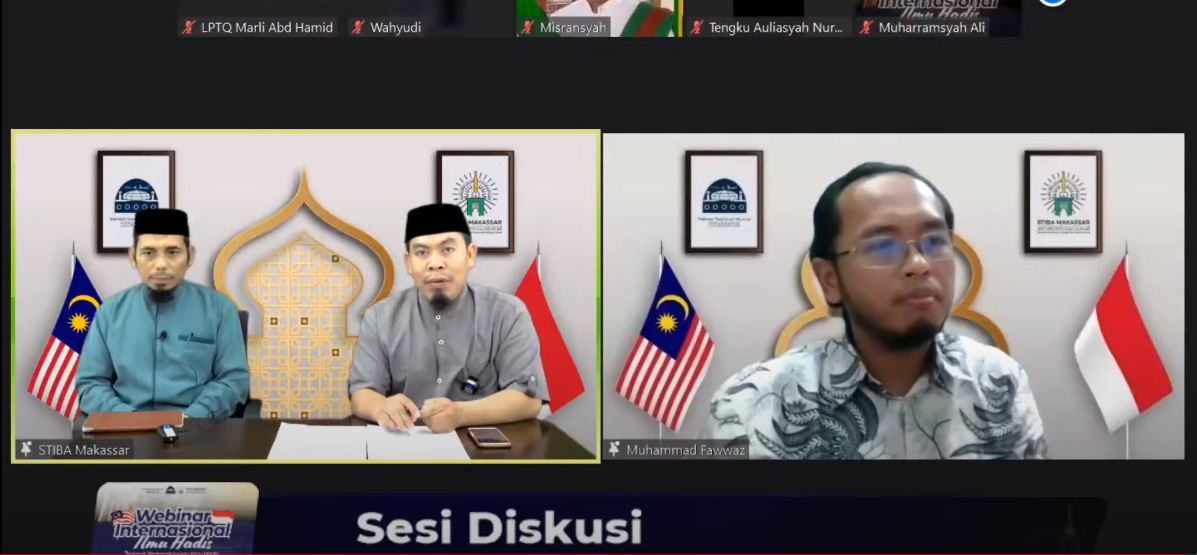
(STIBA.ac.id) Makassar – STIBA Makassar collaborating with USIM Malaysia’s Faculty of Quran and Sunnah Studies held an International Webinar on Hadith Sciences, Thursday (20/10/2022). This event was held online via Zoom Cloud Meeting.
Dr. Muhammad Fawwaz, a lecturer in Hadith Science at the Islamic Science University of Malaysia (USIM), was the first guest speaker. He presented a theme related to the Dictionary of Hadith Biography in the Earliest Period: Historiography and Geography. As for STIBA, the former head of STIBA Makassar, also a hadith lecturer at the same institution, was the second resource person. The theme covered is Important Works in the Field of Hadith in the First Centuries. Dr. Muhammad Basran Yusuf, Head of the STIBA Makassar Ulama Cadreization Program (PKU), acted as moderator.
Prior to the presentation of the two speakers, the webinar began with remarks from two keynote speakers. The first remarks was given by the Head of STIBA Makassar Akhmad Hanafi Dain Yunta, Lc., M.A., Ph.D. The deputy chairperson of the Wahdah Islamiyah Sharia Council began by saying that this activity was a continuation of the MoU between STIBA Makassar and USIM.
Regarding the history of the development of the science of hadith, Ustaz Akhmad quoted one hadith of the Prophet sallallaahu ‘alaihi wasallam stating that in every generations there are people chosen by Allah to carry this mandate of knowledge with the scientific capacity they have. They can rectify the deviations of people who want to deviate religion from the true path either by means of extremes or through interpretation.
“Then this knowledge becomes strategic in our religion. Apart from that, hadith is also the second source of law after the Al-Qur’an. Since the time of the Prophet sallallaahu ‘alaihi wasallam, then his companions, scholars from later generations have made efforts to protect the traditions of the Prophet,” he said.
According to Ustaz Akhmad, there are two things known from the development of the scholars’ guard against this sunnah, in which the both cannot be separated.
“First, the person. The capacity of the person who brought this treatise is a person who is fair, has the capability, maximum ability in narrating hadith from the Prophet. Therefore, if we look at it, for example, a person is given the title Al-Hafizh after that person has memorized tens of thousands of hadiths,” he said. The second, according to Ustaz Akhmad, is how the narrators’ ability to leave literature in the form of writing that will be passed on to the next generation. “So this is where the interestingness of this webinar is because it will examine these two things,” he concluded.
Prof. Madya Dr. Mohd. Zohdi Mohd. Amin, the Dean of the USIM Malaysia Faculty of Quran and Sunnah Studies, in his keynote speech, said that there had been collaboration between USIM and STIBA in advance such as USIM visits to STIBA and internship. “And insha Allah, this relationship will be strengthened again in the future by holding joint research in the form of scientific and field studies,” said Prof. Zohdi.
He continued that it was important to jointly play a role in protecting the sunnah, as was done by the al-mutaqaddimin for the sake of keeping the sunnah of the Prophet which is a revelation. Therefore, they try to keep the Sunnah from falsehood.
![]()
